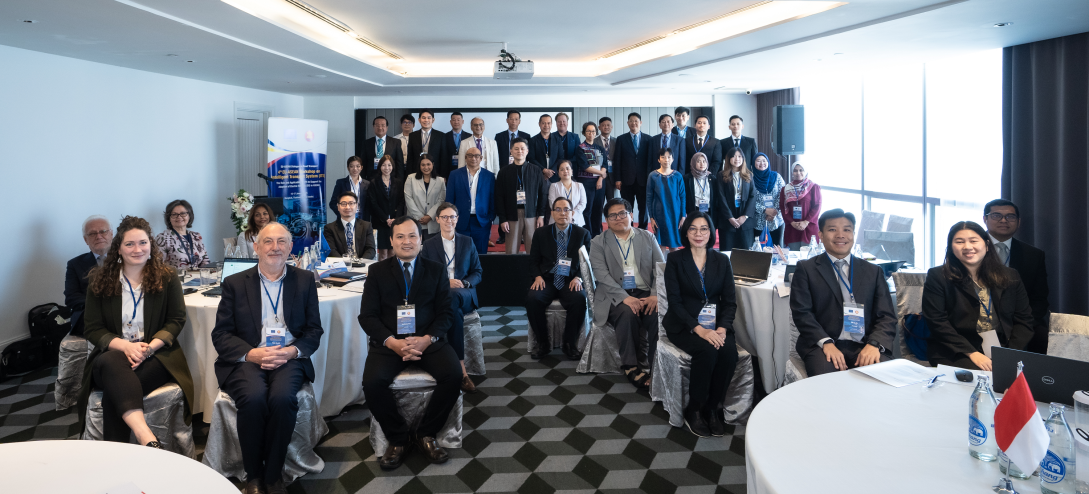EU, ASEAN Champion Intelligent Transport System for Electric Vehicle Adoption in Southeast Asia

EU, ASEAN Champion Intelligent Transport System for Electric Vehicle Adoption in Southeast Asia
The 4th EU-ASEAN Workshop on Intelligent Transport System (ITS) brought together over 46 experts and key stakeholders in Bangkok to tackle one of Southeast Asia’s key transport opportunities: accelerating the adoption of electric vehicles (EVs) through cutting-edge ITS innovations. The event spotlighted the vital role of ITS in driving the region’s sustainable transportation future.
Transport is a cornerstone for regional integration and economic growth but also accounts for over 20% of global carbon dioxide emissions. EVs offer a transformative solution, reducing emissions and reliance on fossil fuels. However, adoption has been slow due to infrastructure gaps, interoperability challenges, grid limitations, and consumers’ diffidence. ITS provides innovative tools to overcome these barriers, instilling confidence in users, and paving the way for sustainable transport to become a reality.
Organised under the Enhanced Regional EU-ASEAN Dialogue Instrument (E-READI), the workshop facilitated exchanges between the Association of Southeast Asian Nations (ASEAN) and the European Union (EU) stakeholders. The three-day event featured key insights into local EV ecosystems from Malaysia, Singapore, Thailand, and Viet Nam. It allowed exchanges on regional initiatives and best practices from both ASEAN and EU, and discussion on the way forward among AMS, and on the possibility of EU-ASEAN collaboration on ITS to support EV adoption.
Lucia Balogova, Deputy Head of the Economic and Trade Section of the EU Delegation to Thailand, stated, “The EU experience has shown that a functioning Intelligent Transport System is crucial for accelerating electric vehicle adoption because it provides the digital and technological backbone that helps overcome key challenges … We trust that the EU experience in ITS and EVs will be useful to the participants in ASEAN, and that this workshop will be an important step for the achievement of deeper collaboration among ASEAN Member States across their borders.”
Sunita Lukkhoo, Head of the European Investment Bank (EIB) Group for Southeast Asia and the Pacific, remarked, “The European Investment Bank stands ready to support ASEAN Member States with tailored financing solutions that drive sustainable, smart mobility and foster a cleaner, more connected transport future.”
ASEAN’s transition to electric mobility is both a challenge and an opportunity, with electric vehicle sales in Southeast Asia expected to grow by over 30% annually in the coming years. As the region still faces significant barriers and varying levels of readiness among member states, leveraging Intelligent Transport System will be key.
Dr Prapatpaow Awakul, Director of the International Affairs Division at Thailand’s Ministry of Transport, remarked, “Electric vehicle adoption in ASEAN is not just an environmental priority but an economic opportunity. Intelligent Transport Systems bridge the gap between innovation and accessibility. Partnering with the EU through E-READI allows us to align with global best practices and build a future-ready transport ecosystem for ASEAN.”
During the workshop, a field visit to Thailand’s Highway Traffic Operations Centre and the Electricity Generating Authority of Thailand (EGAT) Learning Centre was another key session that offered practical demonstrations of ITS applications.
Finally, the workshop also validated findings from the Study on the Role and Applicability of Intelligent Transport System (ITS) to Support the Adoption of Electric Vehicles (EV) in ASEAN supported by the European Union through E-READI. The study emphasised the need for tailored approaches across ASEAN Member States, regional harmonisation of EV standards, and cross-sector collaboration. It will guide policy recommendations and further drive ASEAN’s transition to sustainable transport systems.
# # #
The Association of Southeast Asian Nations (ASEAN) was established on 8 August 1967. The Member States of the Association are Brunei Darussalam, Cambodia, Indonesia, Lao PDR, Malaysia, Myanmar, Philippines, Singapore, Thailand and Viet Nam. On 31 December 2015, the ASEAN Community was formally established. The ASEAN Secretariat is based in Jakarta.
The European Union (EU) is the economic and political union of 27 Member States with a population of 449 million. Together, the EU has built a zone of stability, democracy and sustainable development while maintaining cultural diversity, tolerance and individual freedom. In 2012, the EU was awarded the Nobel Peace Prize for advancing the goals of peace, reconciliation, democracy and human rights in Europe. The EU is the world's largest trading bloc, and the world's largest source and destination of foreign direct investment. Collectively, the EU and its Member States are the largest donors of Official Development Assistance (ODA), providing more than half of ODA globally. The 27 Member States of the EU (in protocol order) are: Belgium, Bulgaria, Czech Republic, Denmark, Germany, Estonia, Ireland, Greece, Spain, France, Croatia, Italy, Cyprus, Latvia, Lithuania, Luxembourg, Hungary, Malta, Netherlands, Austria, Poland, Portugal, Romania, Slovenia, Slovakia, Finland and Sweden.
The Enhanced Regional EU-ASEAN Dialogue Instrument (E-READI) is an EU-financed programme that facilitates cooperation and dialogue between the EU and ASEAN in policy areas of joint interest. Drawing on the EU’s experience of regional integration, E-READI further strengthens both the ASEAN regional integration process as well as the overall ASEAN-EU strategic partnership.
